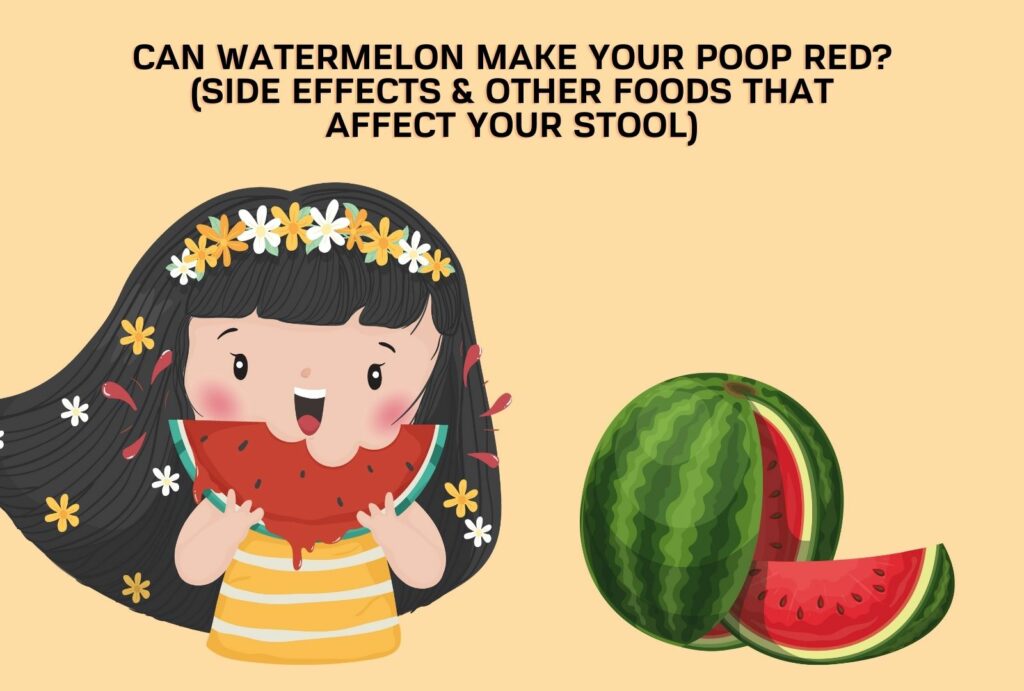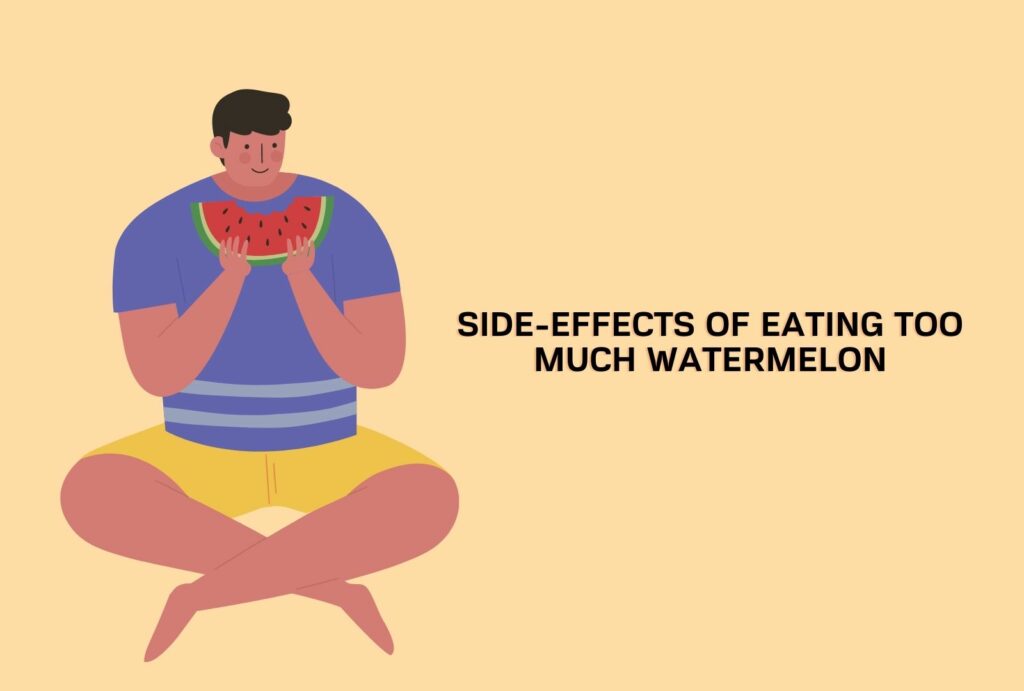
Many people have wondered if eating watermelon can make their poop red. The short answer is yes, watermelon can make your poop red. However, there are a few things to keep in mind before jumping to conclusions.
The red color in watermelon is due to a compound called lycopene. When you eat watermelon, this compound is broken down and can give your poop a reddish hue. However, this is usually not a cause for concern, as the color should return to normal within a day or two.
While watermelon can make your poop red, there are other foods that can also affect the color and texture of your stool. Beets, for example, can turn your stool a dark red color. Iron supplements and certain medications can also cause changes in stool color.
If you are experiencing persistent changes in stool color or texture, it is recommended to speak with a healthcare professional to rule out any underlying health conditions.
While the color of your stool is generally not a cause for concern, there are other side effects that can occur from consuming too much watermelon. One potential side effect is diarrhea, as watermelon is high in fiber and can cause gastrointestinal distress in some individuals.
Additionally, consuming large amounts of watermelon can lead to an increase in blood sugar levels, particularly in individuals with diabetes. It is important to consume watermelon in moderation and monitor blood sugar levels if necessary.
In conclusion, watermelon can make your poop red due to the presence of lycopene, but this is usually not a cause for concern. Other foods and medications can also affect the color and texture of your stool. While the color of your stool is generally not a cause for concern, consuming too much watermelon can lead to side effects such as diarrhea and increased blood sugar levels. As with any dietary changes, it is important to consume watermelon in moderation and speak with a healthcare professional if experiencing persistent changes in stool color or texture.
Can watermelon make your poop red and why?

It is not uncommon for individuals to experience changes in the color of their stool after consuming certain foods. Watermelon, in particular, is known to cause red or pinkish-colored stool in some individuals. The reason behind this is due to a compound found in watermelon called lycopene.
Lycopene
Lycopene is a type of carotenoid pigment that gives fruits and vegetables their vibrant red color. When consumed, lycopene is broken down and metabolized by the body, and can result in the production of red or pinkish-colored stool.
While the idea of red-colored stool may be alarming, it is usually not a cause for concern. The color change is harmless and should resolve on its own within a day or two. However, if you experience persistent changes in stool color or have other symptoms such as abdominal pain or diarrhea, it is recommended to speak with a healthcare professional to rule out any underlying health conditions.
It is also important to note that not everyone may experience red-colored stool after consuming watermelon. The amount of lycopene present in watermelon can vary depending on factors such as ripeness and preparation method. Additionally, individual differences in digestive function can also play a role in how the body metabolizes and absorbs lycopene.
While red-colored stool is generally not a cause for concern, there are some potential side effects associated with consuming too much watermelon. Watermelon is high in fiber, which can cause gastrointestinal distress and diarrhea in some individuals. Additionally, consuming large amounts of watermelon can lead to an increase in blood sugar levels, particularly in individuals with diabetes.
In conclusion, watermelon can make your poop red due to the presence of lycopene. While the color change is harmless and should resolve on its own within a day or two, it is important to speak with a healthcare professional if you experience persistent changes in stool color or have other symptoms. Additionally, consuming too much watermelon can lead to side effects such as diarrhea and increased blood sugar levels, and should be consumed in moderation.
Side-effects of eating too much watermelon

While watermelon is a nutritious and refreshing fruit that is low in calories and high in hydration, consuming too much of it can lead to some potential side effects.
Digestive distress
One of the main side effects of eating too much watermelon is digestive distress. Watermelon is high in fiber, which can be beneficial for promoting regularity and preventing constipation. However, consuming large amounts of fiber can also cause bloating, gas, and diarrhea in some individuals.
Additionally, watermelon is high in fructose, a type of sugar that can cause digestive discomfort in some individuals. Consuming large amounts of fructose can lead to bloating, gas, and abdominal pain, particularly in individuals with irritable bowel syndrome (IBS) or fructose malabsorption.
Blood sugar levels
Another potential side effect of consuming too much watermelon is an increase in blood sugar levels. While watermelon is a relatively low-glycemic fruit, meaning it does not cause a rapid spike in blood sugar levels, consuming large amounts of it can lead to an increase in blood sugar levels, particularly in individuals with diabetes.
Finally, consuming too much watermelon can also lead to a buildup of lycopene in the body, the same compound that can cause red-colored stool. While lycopene is a beneficial antioxidant that has been linked to a reduced risk of certain diseases, excessive intake can lead to side effects such as skin discoloration and gastrointestinal upset.
In conclusion, while watermelon is a healthy and nutritious fruit that is generally safe for consumption, consuming too much of it can lead to potential side effects such as digestive distress, increased blood sugar levels, and lycopene buildup. It is recommended to consume watermelon in moderation and to speak with a healthcare professional if you experience any persistent symptoms or have concerns about your diet.
Do other foods too affect the color of your poop?
Yes, other foods can also affect the color of your poop. The color of your poop is mainly determined by the amount of bile in it, which is a yellow-green fluid that is produced by the liver to aid in digestion. However, certain foods can change the color of your poop, either temporarily or for a more extended period.
For example, beets are known to turn your poop reddish or pinkish, just like watermelon. This is due to a pigment called betanin, which is found in beets and is not easily broken down during digestion. Other foods that can cause changes in poop color include blueberries, black licorice, and certain types of food coloring.
Green leafy vegetables like spinach and kale are high in chlorophyll, which can also cause your poop to be green. While this is usually harmless, persistent green stool can indicate a more serious underlying condition such as malabsorption or infection.
Additionally, consuming large amounts of dairy products like milk, cheese, and yogurt can cause your poop to be pale or clay-colored due to the low amount of bile that is produced when consuming these foods.
In conclusion, while watermelon is not the only food that can affect the color of your poop, it is essential to be aware of how certain foods can cause changes in stool color. In most cases, changes in poop color are temporary and harmless, but persistent changes or other accompanying symptoms should be discussed with a healthcare professional to rule out any underlying conditions.
What can blood in your stool mean?
Blood in your stool can be a sign of a potentially serious health condition, and should never be ignored. It is crucial to identify the underlying cause of blood in your stool, as treatment may be necessary to prevent further complications.
Hemorrhoids
One possible cause of blood in your stool is hemorrhoids, which are swollen veins in the anus or lower rectum. Hemorrhoids can cause bright red blood on the surface of the stool, or on the toilet paper after wiping. Hemorrhoids are usually not serious and can be treated with over-the-counter creams or suppositories, but in severe cases, surgery may be necessary.
Inflammatory bowel disease (IBD)
Another possible cause of blood in your stool is inflammatory bowel disease (IBD), which includes conditions such as ulcerative colitis and Crohn’s disease. These conditions cause inflammation in the digestive tract, which can lead to ulcers, bleeding, and other complications. Symptoms of IBD include diarrhea, abdominal pain, and fatigue. Treatment for IBD includes medication, lifestyle changes, and, in severe cases, surgery.
Colorectal cancer
Colorectal cancer is also a possible cause of blood in your stool. In its early stages, colorectal cancer may not cause any noticeable symptoms, but as it progresses, it can cause blood in the stool, as well as abdominal pain, fatigue, and unintended weight loss. Treatment for colorectal cancer depends on the stage of the cancer but often includes surgery, radiation, and chemotherapy.
Diverticulitis
Other potential causes of blood in your stool include infections, anal fissures, and diverticulitis. Infections can cause inflammation in the digestive tract, leading to bleeding and other symptoms. Anal fissures are small tears in the skin around the anus, which can cause pain and bleeding during bowel movements. Diverticulitis occurs when small pouches in the colon become infected or inflamed, which can cause abdominal pain, fever, and bleeding.
In conclusion, blood in your stool can indicate a range of potentially serious health conditions, and should be evaluated by a healthcare professional. While foods like watermelon can cause red stools, it is crucial to differentiate between temporary and more serious causes of blood in your stool. If you experience any bleeding or other concerning symptoms, seek medical attention promptly.
What are the best diets for your poop?
Healthy bowel movements
A healthy diet can play a significant role in promoting healthy bowel movements. Fiber-rich foods can help regulate bowel movements and prevent constipation. Foods like fruits, vegetables, whole grains, and legumes are excellent sources of fiber. Adding probiotics to your diet can also improve your gut health and promote regular bowel movements. Foods like yogurt, kefir, and fermented vegetables like kimchi and sauerkraut are rich in probiotics.
In contrast, diets high in processed and fast foods can have a negative impact on your bowel movements. These foods are usually low in fiber, making them difficult to digest and causing constipation. Additionally, these foods can cause inflammation in your gut, leading to discomfort and other digestive issues.
Dehydration
Dehydration can also cause constipation and other digestive problems. Drinking enough water and staying hydrated can help prevent these issues. A good rule of thumb is to drink at least eight glasses of water per day.
It’s also essential to pay attention to your body and any symptoms you may be experiencing. If you notice any changes in your bowel movements or experience any pain or discomfort, it’s essential to speak with a healthcare provider.
In summary, a diet rich in fiber and probiotics, along with adequate hydration, can promote healthy bowel movements. Processed and fast foods should be limited, and any changes in bowel movements should be discussed with a healthcare provider.
Conclusion
In conclusion, the color of your poop can be influenced by various factors, including your diet. While it is uncommon, eating too much watermelon can make your poop red due to the presence of lycopene. However, this is usually harmless and will go away on its own. It is essential to pay attention to any other symptoms you may be experiencing and seek medical attention if necessary. Maintaining a healthy diet and staying hydrated is essential for promoting healthy bowel movements. Foods rich in fiber and probiotics can help regulate bowel movements and improve gut health, while processed and fast foods should be limited. It’s also important to listen to your body and any symptoms you may be experiencing.
If you notice any significant changes in your bowel movements, such as blood or persistent discomfort, it’s essential to seek medical attention. These symptoms could indicate a more severe underlying issue and should not be ignored.
Overall, a healthy diet and lifestyle are crucial for promoting healthy bowel movements and maintaining overall digestive health. While watermelon may cause red poop in some cases, it is usually harmless and should not be a cause for concern.